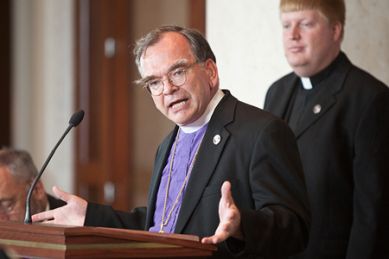ACNA Founding Body Splits Over 'Dual Citizenship' Issues

A founding body of the Anglican Church in North America (ACNA) announced that it will be splitting from the church due to confusion over its "dual citizenship" status in the ACNA and the Episcopal Church of Rwanda.
The Anglican Mission in America (AMiA), which is a missionary outreach of the Rwandan Church, released a communiqué on Tuesday saying that its "dual citizenship" approach had resulted in "significant confusion within the Anglican Mission and the ACNA regarding membership in two provinces, and more importantly, is inconsistent with the Constitution and Canons of the Province of the Anglican Church in Rwanda."
"Practically speaking, this jurisdictional/membership status became untenable and non-sustainable," they said.
The group's communiqué comes following a January resolution from the Rwandan Church's House of Bishops that objected to the cloudy structural relationship between the AMiA and the ACNA.
The AMiA says that they will apply next month to change their status in the ACNA from Member to Ministry Partner – a move that the group says will allow them to "continue to function as a missionary movement committed to church planting" and will "serve to overcome the inherent confusion that has arisen."
Leadership in both churches have expressed contentment over the decision.
Bishop Chuck Murphy, Primatial Vicar of AMiA, said that he is "delighted that the Anglican Church in North America is now successfully up and running."
"As one of the founding members of the ACNA, we in the Anglican Mission have invested significant time and energy into its formation and we remain strongly supportive of the Province and Archbishop Duncan's leadership of this important new work," Murphy said.
Archbishop Robert Duncan of the ACNA noted, "The vision of a biblical, missionary and united Anglicanism in North America remains the vision of every North American Anglican. Jurisdictional integration also remains a future hope as Rwandan canons do provide for the transfer of the Anglican Mission to the Anglican Church in North America when the time seems right."
Others in the church, however, have been less enthusiastic about the split, which they see as a major loss for the ACNA.
"Try as the announcement does to make this sound like good news--or at least not a very big deal--apparently a large portion of the ACNA is withdrawing from full membership and falling back to what seems to amount to a 'friendly fellow traveler' status," a Texas presbyter for the ACNA said. "I, for one, have never thought of FACA--a Ministry Partner--as a member of ACNA but rather as folks who share many of our values as Anglicans and want to work together with us as much as possible."
"I would be lying if I said I wasn't disappointed by this news," he continued. "I am completely committed to the future of the ACNA. Thus it saddens me to see the province diminished in this way."
Founded in June 2009, the ACNA claims a membership of about 100,000 Anglicans in 800 congregations across the U.S. and Canada. The AMiA represents 156 congregations in the U.S., Canada, and Colombia.